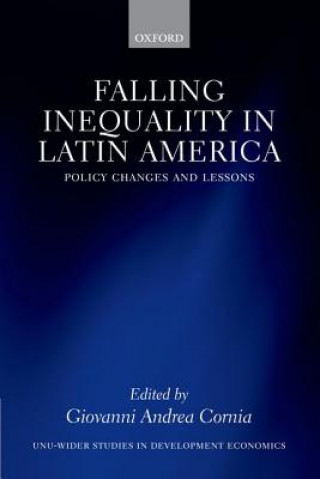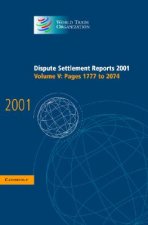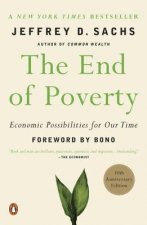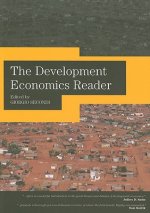
Kód: 02703844
Falling Inequality in Latin America
Autor Giovanni Andrea Cornia
The volume aims to document and explain the sizeable decline of income inequality that has taken place in Latin America during the 2000s. It does so through an exploration of inequality changes in six representative countries, and ... celý popis
- Jazyk:
 Angličtina
Angličtina - Vazba: Pevná
- Počet stran: 398
Nakladatelství: Oxford University Press, 2014
- Více informací o knize

Mohlo by se vám také líbit
-

Dispute Settlement Reports 2001: Volume 5, Pages 1777-2074
7580 Kč -

From Corruption to Modernity
1681 Kč -

Securing Anastomosis in Visceral Surgery, w. DVD
868 Kč -

Worst Journey in the World
386 Kč -

Transforming Mental Health and Substance Abuse Systems of Care
532 Kč -

Essays on Saving, Bequests, Altruism, and Life-cycle Planning
351 Kč -

Active Arithmetic!
444 Kč
Darujte tuto knihu ještě dnes
- Objednejte knihu a zvolte Zaslat jako dárek.
- Obratem obdržíte darovací poukaz na knihu, který můžete ihned předat obdarovanému.
- Knihu zašleme na adresu obdarovaného, o nic se nestaráte.
Více informací o knize Falling Inequality in Latin America
Nákupem získáte 491 bodů
 Anotace knihy
Anotace knihy
The volume aims to document and explain the sizeable decline of income inequality that has taken place in Latin America during the 2000s. It does so through an exploration of inequality changes in six representative countries, and ten policy chapters dealing with macroeconomics, foreign trade, taxation, labour market, human capital formation, and social assistance, which point to the emergence of a 'new policy model'. The volume addresses a major issue in economic development with profound implications for many developing regions and those OECD countries mired in a long-lasting financial crisis and economic stagnation. For at least the last quarter of the twentieth century, Latin America suffered from low growth, rising inequality, and frequent financial crises. However, since the turn of the century, growth accelerated, inequality declined, poverty fell, and macroeconomic stability improved, all this in parallel to the spread of centre-left political regimes in three quarters of the region. This inequality decline has taken many by surprise as, for a long time, the region has been a symbol of a deeply entrenched unequal distribution of assets, incomes, and opportunities, limited or no state redistribution, and a deeply embedded authoritarianism enforcing an unjust status quo. The recent Latin American experience is particularly valuable as inequality was reduced under open economy conditions and in a period of intensifying global integration, which have often been considered as a source of rising inequality. In this sense, however imperfect, the recent Latin American experience may be of interest to countries completing their transition to the market and liberal democracy (as in the former socialist countries of Europe), facing a political transition (as those affected by the Arab Spring, Myanmar and countries in sub-Saharan Africa), or recording rises in inequality and social tensions in spite of rapid economic growth (as in China and India). Until recently there was not much agreement on the drivers of the inequality decline in the region, which was attributed to changes in the supply/demand of skilled workers, improvements in terms of trade, the spread of social assistance schemes, or 'luck'. In this respect, the volume offers the first scholarly and systematic exploration of this unexpected change. As income inequality has been rising and is currently rising in many parts of the world, a good understanding of the Latin American experience over the 2000s is a topic that will inform and generate a lot of attention.
 Parametry knihy
Parametry knihy
Zařazení knihy Knihy v angličtině Economics, finance, business & management Economics Development economics & emerging economies
4911 Kč
- Plný název: Falling Inequality in Latin America
- Autor: Giovanni Andrea Cornia
- Jazyk:
 Angličtina
Angličtina - Vazba: Pevná
- Počet stran: 398
- EAN: 9780198701804
- ISBN: 0198701802
- ID: 02703844
- Nakladatelství: Oxford University Press
- Hmotnost: 758 g
- Rozměry: 161 × 242 × 28 mm
- Datum vydání: 16. January 2014
Oblíbené z jiného soudku
-

Poor Economics
374 Kč -

Agile Extension to the BABOK(R) Guide
933 Kč -

Banker to the Poor
403 Kč -

Next Convergence
409 Kč -

Prosperity Paradox
544 Kč -

Reinventing the Organization
638 Kč -

Factfulness Illustrated
670 Kč -

Ecology of Wisdom
303 Kč -

Introduction to Modern Economic Growth
1695 Kč -

How to Spend $50 Billion to Make the World a Better Place
592 Kč -

Shaping the Future of the Fourth Industrial Revolution
483 Kč -

Start Something That Matters
358 Kč -

Age of Sustainable Development
966 Kč -

Introduction to Sustainable Development
1892 Kč -

End of Poverty
441 Kč -

Methods to Analyse Agricultural Commodity Price Volatility
6077 Kč -

Getting Better
621 Kč -

Dubai
882 Kč -

China's Resource Diplomacy in Africa
3313 Kč -

Modern Evolutionary Economics
970 Kč -

History of Development
772 Kč -

Brand Premium
775 Kč -

WTF?
720 Kč -

Economic Development
2544 Kč -

Resurgent Asia
1614 Kč -

Institutional Barriers in the Transition to Market
3313 Kč -

Development Economics Reader
2961 Kč -

Foreign Aid, War, and Economic Development
1257 Kč -

Transitions to Sustainable Development
5474 Kč -

Technological Innovation and Economic Development in Modern Japan
1702 Kč -

Living Standards and the Wealth of Nations
351 Kč -

Impact Evaluation in Practice
1189 Kč -

New Paradigm for Korea's Economic Development
3313 Kč -

New Paradigm for Korea's Economic Development
3313 Kč -

War and Economic Development
1257 Kč -

Islam, Authoritarianism, and Underdevelopment
925 Kč -

Zimbabwe's Casino Economy. Extraordinary Measures for Extraordinary Challenges
1381 Kč -

Jeffrey Sachs
475 Kč -

ISO 50001 Energy Management Systems
523 Kč -

BRICS
3227 Kč -

Poland From Partitions to EU Accession
3907 Kč -

Passions and the Interests
500 Kč -

Wall Street
702 Kč -

The Future of Resilient Finance
3663 Kč -

Capitalism with Chinese Characteristics
925 Kč -

Socialist Insecurity
1613 Kč -

International Standard Industrial Classification of All Economic Activities (ISIC)
2432 Kč -

Green Capitalism. The God that Failed
774 Kč -

Kyrgyzstan
1701 Kč
Osobní odběr Praha, Brno a 12903 dalších
Copyright ©2008-24 nejlevnejsi-knihy.cz Všechna práva vyhrazenaSoukromíCookies



 Vrácení do měsíce
Vrácení do měsíce 571 999 099 (8-15.30h)
571 999 099 (8-15.30h)